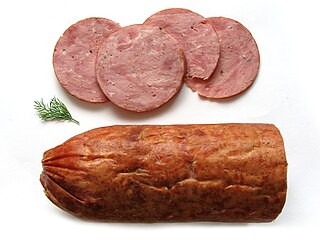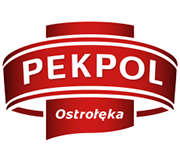
Ham is pork from a leg cut that has been preserved by wet or dry curing, with or without smoking. As a processed meat, the term "ham" includes both whole cuts of meat and ones that have been mechanically formed.

The cuisine of the Southern United States developed in the traditionally defined American South. Regional and cultural backgrounds shape Southern cuisine, such as Tidewater, Appalachian, Cajun, Creole, Lowcountry, and Floribbean being different types of Southern cuisine. In recent history, elements of Southern cuisine have spread around the United States, having an effect on the development of other types of American cuisine.

Tar Heel is a town located in Bladen County, North Carolina, in the United States. As of the 2010 census, the town population was 117.

Hormel Foods Corporation is an American company founded in 1891 in Austin, Minnesota, by George A. Hormel as George A. Hormel & Company. Originally focusing on the packaging and selling of ham, Spam, sausage and other pork, chicken, beef and lamb products to consumers; by the 1980s, Hormel began offering a wider range of packaged and refrigerated foods. The company changed its name to Hormel Foods in 1993. Hormel serves 80 countries with brands such as Applegate, Columbus Craft Meats, Dinty Moore, Jennie-O, and Skippy.
Hatfield Quality Meats is primarily a pork meat packing company based in Hatfield, Pennsylvania. It produces over 1,200 different fresh and manufactured pork products. Hatfield's distribution is primarily on the East Coast of the United States, as well as some international markets. Their hot dogs are sold at Philadelphia Phillies and Washington Nationals baseball home games.

The Dubuque Packing Company was a former meat packing company that operated under a variety of names in Dubuque, Iowa from 1891 until 2001. It was recognized for the quality of its products, and in the 1950s became the second-largest employer in the city. The company was widely known in the community as "The Pack." The company used the fleur-de-lis logo as its trademark.
Arbogast & Bastian was the name of a slaughterhouse and meat packing plant located in Allentown, Lehigh County, Pennsylvania, in the United States. Once a national leader in hog slaughtering, the company had the capacity to process most of the 850,000 hogs raised annually in Pennsylvania for slaughtering. In its heyday, Arbogast & Bastian slaughtered an average of 4,000 hogs daily.

JBS USA Holdings, Inc. is an American food processing company and a wholly owned subsidiary of JBS S.A. (B3:JBSS3), a Brazilian company that is the world's largest processor of fresh beef and pork, with more than US$50 billion in annual sales as of 2017. The subsidiary was created when JBS entered the U.S. market in 2007 with its purchase of Swift & Company.
Smithfield Foods, Inc., is a pork producer and food-processing company based in Smithfield, Virginia, in the United States, and a wholly owned subsidiary of WH Group of China. Founded in 1936 as the Smithfield Packing Company by Joseph W. Luter and his son, the company is the largest pig and pork producer in the world. In addition to owning over 500 farms in the US, Smithfield contracts with another 2,000 independent farms around the country to grow Smithfield's pigs. Outside the US, the company has facilities in Mexico, Poland, Romania, Germany, and the United Kingdom. Globally the company employed 50,200 in 2016 and reported an annual revenue of $14 billion. Its 973,000-square-foot meat-processing plant in Tar Heel, North Carolina, was said in 2000 to be the world's largest, processing 32,000 pigs a day.
Joseph W. Luter III is the former chairman of Smithfield Foods, the world's largest hog producer and pork processor.

Wright Brand Foods, Inc. was a meat-packing company located in Vernon, Texas, that was eventually bought by the Tyson Foods corporation in 2001. Begun in 1922 by Egbert Eggleston, what would eventually become a multimillion-dollar business started out in the back of a local grocery store.
Cargill Meat Solutions is a subsidiary of the Minneapolis-based multinational agribusiness giant Cargill Inc, that comprises Cargill's North American beef, turkey, food service and food distribution businesses. Cargill Meat Solutions' corporate office is located in Wichita, Kansas, United States. Jody Horner is the division's president.
William Davies Company was a pork processing and packing company in Toronto, Ontario, Canada. At one time, it was the largest pork packer in the British Empire, and it operated Canada's first major chain of food stores. One of Toronto's longstanding nicknames, "Hogtown", is attributable to the millions of pigs processed annually by the William Davies Company.

WH Group, formerly known as Shuanghui Group, is a publicly traded Chinese multinational meat and food processing company headquartered in Hong Kong. Sometimes also known as Shineway Group in English-speaking countries, the company's businesses include hog raising, consumer meat products, flavoring products, and logistics. It is the largest pork producer in the world, and the largest meat producer in China.

Ham sausage is a sausage prepared using ham and other ingredients, the latter varying by location. It is a part of the cuisines of China, Germany, Poland and the United States. Ham sausage is a mass-produced food product.

Pekpol is a corporate group of enterprises specialised in the food industry of meat products, with its headquarters based in Ława near Ostrołęka in Poland. The company handles the production and distribution of bacon, thin and thick kiełbasa, sausages and mortadella, deli meats and block meat products.
Litigation related to Smithfield Foods mostly consists of nuisance suits related to the disposal of hog waste using anaerobic lagoons. State governments have responded to the suits against Smithfield and similar litigation by strengthening right-to-farm laws.

The meat industry has been severely affected by the COVID-19 pandemic in the United States. Outbreaks of the virus have taken place in factories operated by the meat packing industry and the poultry processing industry. These outbreaks affected dozens of plants, leading to closures of some factories and disruption of others, and posed a significant threat to the meat supply in the United States. By April 27, there were at least 115 facilities with cases across 23 states, and at least 4,913 workers diagnosed positive with COVID-19, or approximately 3 percent of the workforce, with 20 deaths reported. By May 5, over 10,000 meatpacking plant workers in 29 states and working at 170 plants had tested positive for the coronavirus. At least 45 of those meat industry workers had died. As of May 20, at least 15,300 workers have been infected with COVID-19 at 192 different meatpacking plants in the United States, based on ongoing reporting by the Midwest Center for Investigative Reporting and USA Today. At least 63 of those workers have died from the disease.

During the COVID-19 pandemic in Canada, outbreaks of the virus took place in factories operated by the meat packing industry and the poultry processing industry. These outbreaks affected multiple plants, leading to closures of some factories and disruption of others, and posing a threat to the food supply in Canada.










